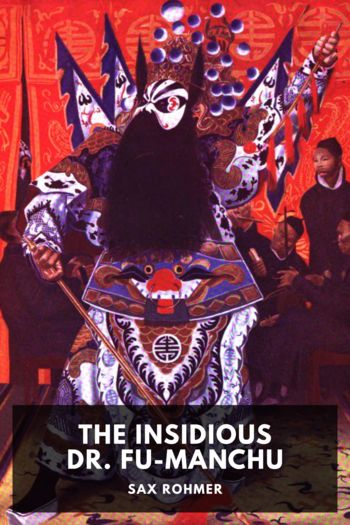The Insidious Dr. Fu Manchu - Sax Rohmer (best ebook reader TXT) 📗

- Author: Sax Rohmer
- Performer: -
Book online «The Insidious Dr. Fu Manchu - Sax Rohmer (best ebook reader TXT) 📗». Author Sax Rohmer
Yet I could make little progress. Between my mind and the chapter upon
which I was at work a certain sentence persistently intruded itself.
It was as though an unseen hand held the written page closely before my eyes.
This was the sentence:
“Imagine a person, tall, lean, and feline, high-shouldered, with a brow
like Shakespeare and a face like Satan, a close-shaven skull, and long,
magnetic eyes of the true cat-green: invest him with all the cruel cunning
of an entire Eastern race, accumulated in one giant intellect…”
Dr. Fu-Manchu! Fu-Manchu as Smith had described him to me on that night
which now seemed so remotely distant—the night upon which I had learned
of the existence of the wonderful and evil being born of that secret
quickening which stirred in the womb of the yellow races.
As Smith, for the ninth or tenth time, knocked out his pipe on a bar
of the grate, the cuckoo clock in the kitchen proclaimed the hour.
“Two,” said James Weymouth.
I abandoned my task, replacing notes and writing-block in the bag that I
had with me. Weymouth adjusted the lamp which had begun to smoke.
I tiptoed to the stairs and, stepping softly, ascended to the sick room.
All was quiet, and Mrs. Weymouth whispered to me that the patient still
slept soundly. I returned to find Nayland Smith pacing about the room
in that state of suppressed excitement habitual with him in the approach
of any crisis. At a quarter past two the breeze dropped entirely,
and such a stillness reigned all about us as I could not have supposed
possible so near to the ever-throbbing heart of the great metropolis.
Plainly I could hear Weymouth’s heavy breathing. He sat at the window
and looked out into the black shadows under the cedars. Smith ceased
his pacing and stood again on the rug very still. He was listening!
I doubt not we were all listening.
Some faint sound broke the impressive stillness, coming from the direction
of the village street. It was a vague, indefinite disturbance,
brief, and upon it ensued a silence more marked than ever.
Some minutes before, Smith had extinguished the lamp.
In the darkness I heard his teeth snap sharply together.
The call of an owl sounded very clearly three times.
I knew that to mean that a messenger had come; but from whence or bearing
what tidings I knew not. My friend’s plans were incomprehensible to me,
nor had I pressed him for any explanation of their nature, knowing him
to be in that high-strung and somewhat irritable mood which claimed him
at times of uncertainty—when he doubted the wisdom of his actions,
the accuracy of his surmises. He gave no sign.
Very faintly I heard a clock strike the half-hour. A soft breeze
stole again through the branches above. The wind I thought must
be in a new quarter since I had not heard the clock before.
In so lonely a spot it was difficult to believe that the bell
was that of St. Paul’s. Yet such was the fact.
And hard upon the ringing followed another sound—a sound we all had expected,
had waited for; but at whose coming no one of us, I think, retained complete
mastery of himself.
Breaking up the silence in a manner that set my heart wildly leaping it came—
an imperative knocking on the door!
“My God!” groaned Weymouth—but he did not move from his position
at the window.
“Stand by, Petrie!” said Smith.
He strode to the door—and threw it widely open.
I know I was very pale. I think I cried out as I fell back—
retreated with clenched hands from before THAT which stood
on the threshold.
It was a wild, unkempt figure, with straggling beard, hideously staring eyes.
With its hands it clutched at its hair—at its chin; plucked at its mouth.
No moonlight touched the features of this unearthly visitant,
but scanty as was the illumination we could see the gleaming teeth—
and the wildly glaring eyes.
It began to laugh—peal after peal—hideous and shrill.
Nothing so terrifying had ever smote upon my ears.
I was palsied by the horror of the sound.
Then Nayland Smith pressed the button of an electric torch which he carried.
He directed the disk of white light fully upon the face in the doorway.
“Oh, God!” cried Weymouth. “It’s John!”—and again and again:
“Oh, God! Oh, God!”
Perhaps for the first time in my life I really believed (nay, I
could not doubt) that a thing of another world stood before me.
I am ashamed to confess the extent of the horror that came upon me.
James Weymouth raised his hands, as if to thrust away from him
that awful thing in the door. He was babbling—prayers, I think,
but wholly incoherent.
“Hold him, Petrie!”
Smith’s voice was low. (When we were past thought or intelligent action,
he, dominant and cool, with that forced calm for which, a crisis over,
he always paid so dearly, was thinking of the woman who slept above.)
He leaped forward; and in the instant that he grappled with
the one who had knocked I knew the visitant for a man of flesh
and blood—a man who shrieked and fought like a savage animal,
foamed at the mouth and gnashed his teeth in horrid frenzy;
knew him for a madman—knew him for the victim of Fu-Manchu—
not dead, but living—for Inspector Weymouth—a maniac!
In a flash I realized all this and sprang to Smith’s assistance.
There was a sound of racing footsteps and the men who had been
watching outside came running into the porch. A third was with them;
and the five of us (for Weymouth’s brother had not yet grasped
the fact that a man and not a spirit shrieked and howled in our midst)
clung to the infuriated madman, yet barely held our own with him.
“The syringe, Petrie!” gasped Smith. “Quick! You must manage
to make an injection!”
I extricated myself and raced into the cottage for my bag.
A hypodermic syringe ready charged I had brought with me
at Smith’s request. Even in that thrilling moment I could
find time to admire the wonderful foresight of my friend,
who had divined what would befall—isolated the strange,
pitiful truth from the chaotic circumstances which saw us
at Maple Cottage that night.
Let me not enlarge upon the end of the awful struggle.
At one time I despaired (we all despaired) of quieting the poor,
demented creature. But at last it was done; and the gaunt,
bloodstained savage whom we had known as Detective-Inspector
Weymouth lay passive upon the couch in his own sitting-room. A
great wonder possessed my mind for the genius of the uncanny
being who with the scratch of a needle had made a brave
and kindly man into this unclean, brutish thing.
Nayland Smith, gaunt and wild-eyed, and trembling yet with his
tremendous exertions, turned to the man whom I knew to be
the messenger from Scotland Yard.
“Well?” he rapped.
“He is arrested, sir,” the detective reported. “They have kept
him at his chambers as you ordered.”
“Has she slept through it?” said Smith to me.
(I had just returned from a visit to the room above.) I nodded.
“Is HE safe for an hour or two?”—indicating the figure on the couch.
“For eight or ten,” I replied grimly.
“Come, then. Our night’s labors are not nearly complete.”
LATER was forthcoming evidence to show that poor Weymouth had lived
a wild life, in hiding among the thick bushes of the tract of land
which lay between the village and the suburb on the neighboring hill.
Literally, he had returned to primitive savagery and some of his food
had been that of the lower animals, though he had not scrupled to steal,
as we learned when his lair was discovered.
He had hidden himself cunningly; but witnesses appeared who had seen him,
in the dusk, and fled from him. They never learned that the object
of their fear was Inspector John Weymouth. How, having escaped death
in the Thames, he had crossed London unobserved, we never knew;
but his trick of knocking upon his own door at half-past two each morning
(a sort of dawning of sanity mysteriously linked with old custom)
will be a familiar class of symptom to all students of alienation.
I revert to the night when Smith solved the mystery of the knocking.
In a car which he had in waiting at the end of the village we sped
through the deserted streets to New Inn Court. I, who had followed
Nayland Smith through the failures and successes of his mission,
knew that tonight he had surpassed himself; had justified the confidence
placed in him by the highest authorities.
We were admitted to an untidy room—that of a student,
a traveler and a crank—by a plain-clothes officer.
Amid picturesque and disordered fragments of a hundred ages,
in a great carven chair placed before a towering statue
of the Buddha, sat a handcuffed man. His white hair
and beard were patriarchal; his pose had great dignity.
But his expression was entirely masked by the smoked glasses
which he wore.
Two other detectives were guarding the prisoner.
“We arrested Professor Jenner Monde as he came in, sir,”
reported the man who had opened the door. “He has made no statement.
I hope there isn’t a mistake.”
“I hope not,” rapped Smith.
He strode across the room. He was consumed by a fever of excitement.
Almost savagely, he tore away the beard, tore off the snowy wig dashed
the smoked glasses upon the floor.
A great, high brow was revealed, and green, malignant eyes, which fixed
themselves upon him with an expression I never can forget.
IT WAS DR. FU-MANCHU!
One intense moment of silence ensued—of silence which seemed
to throb. Then:
“What have you done with Professor Monde?” demanded Smith.
Dr. Fu-Manchu showed his even, yellow teeth in the singularly evil
smile which I knew so well. A manacled prisoner he sat as unruffled
as a judge upon the bench. In truth and in justice I am compelled
to say that Fu-Manchu was absolutely fearless.
“He has been detained in China,” he replied, in smooth,
sibilant tones—“by affairs of great urgency. His well-known
personality and ungregarious habits have served me well, here!”
Smith, I could see, was undetermined how to act; he stood tugging at his ear
and glancing from the impassive Chinaman to the wondering detectives.
“What are we to do, sir?” one of them asked.
“Leave Dr. Petrie and myself alone with the prisoner, until I call you.”
The three withdrew. I divined now what was coming.
“Can you restore Weymouth’s sanity?” rapped Smith abruptly.
“I cannot save you from the hangman, nor”—his fists clenched
convulsively—“would I if I could; but—”
Fu-Manchu fixed his brilliant eyes upon him.
“Say no more, Mr. Smith,” he interrupted; “you misunderstand me.
I do not quarrel with that, but what I have done from conviction
and what I have done of necessity are separated—are seas apart.
The brave Inspector Weymouth I wounded with a poisoned needle,
in self-defense; but I regret his condition as greatly as you do.
I respect such a man. There is an antidote to the poison
of the needle.”
“Name it,” said Smith.
Fu-Manchu smiled again.
“Useless,” he replied. “I alone can prepare it. My secrets
shall die with me. I will make a sane man of Inspector Weymouth,
but no one else shall be in the house but he and I.”





Comments (0)